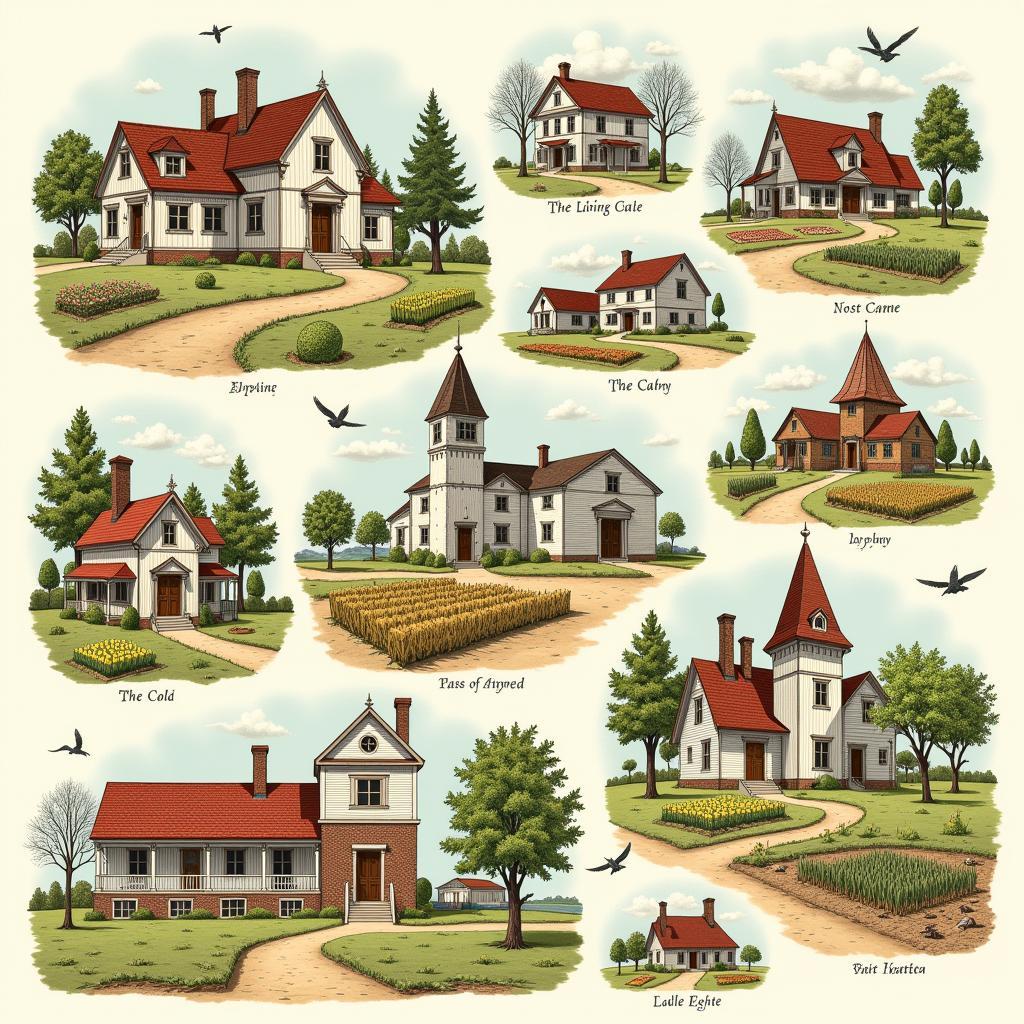The pursuit of a utopian society, a perfect and harmonious world, has captivated American thinkers and reformers for centuries. The term “Utopian Society Apush” often surfaces in history classes, inviting us to examine the various attempts throughout US history to establish communities that embody the ideal of a perfect social, political, and economic order. These social experiments, while often short-lived, offer valuable insights into the complexities of social reform and the enduring human desire for a better world.
Early American Utopias: Seeking Religious Freedom and Social Harmony
The story of utopian societies in America is deeply intertwined with the nation’s founding. Many early settlers, fleeing religious persecution in Europe, sought to create communities that reflected their values and beliefs. The Puritans, for example, envisioned a “city upon a hill” in Massachusetts Bay Colony, a beacon of righteousness meant to inspire the world. While not utopian in the sense of achieving absolute perfection, their experiment highlights the potent mix of idealism and religious fervor that fueled many early American settlements.
 Early American Utopian Communities
Early American Utopian Communities
19th Century Utopianism: From Transcendentalism to Communalism
The 19th century witnessed a surge of utopian experiments, fueled by the rise of transcendentalism, a philosophical movement emphasizing individualism, self-reliance, and a connection to nature. Notable among these was Brook Farm, founded in 1841 by George Ripley near Boston. This community aimed to achieve a balance between intellectual pursuits and manual labor, attracting prominent figures like Nathaniel Hawthorne and Henry David Thoreau.
Simultaneously, the Second Great Awakening, a period of religious revival, gave rise to new utopian communities like the Shakers, known for their craftsmanship and commitment to celibacy, and the Oneida Community, which practiced communal living and complex marriage. These groups, while diverse in their beliefs and practices, shared a common thread of seeking social harmony and spiritual fulfillment outside mainstream society.
The Challenges of Utopia: Internal Strife and External Pressures
Despite their noble intentions, utopian societies often faced significant challenges. Internal disagreements, power struggles, and the difficulty of maintaining such idealized social structures led to the downfall of many communities. External pressures, including economic hardship, social stigma, and conflicts with surrounding communities, also contributed to their instability.
For instance, the utopian experiment at New Harmony, Indiana, founded by Welsh industrialist Robert Owen, crumbled due to internal conflicts and a lack of shared vision among its members. This recurring pattern of rise and fall among utopian societies underscores the complexities of social engineering and the challenges of achieving lasting societal transformation.
 Challenges Faced by Utopian Societies
Challenges Faced by Utopian Societies
Utopian Ideals in Modern Society: Echoes of the Past, Visions for the Future
While the era of grand utopian experiments may be behind us, the yearning for a more just and equitable society persists. The legacy of utopian thinking continues to inspire contemporary social movements and reform efforts, urging us to imagine and strive for a better world. The echoes of these historical experiments can be seen in movements advocating for social justice, environmental sustainability, and economic equality.
Conclusion: Learning from Utopian Dreams
The pursuit of a utopian society, while often fraught with challenges, offers valuable lessons about human nature, social dynamics, and the complexities of societal change. Studying these historical experiments allows us to critically examine our own values and aspirations, prompting reflection on what constitutes a truly just and equitable society. As we navigate the challenges of the 21st century, remembering these utopian dreams, both their aspirations and their limitations, can serve as a compass guiding us toward a more just and compassionate future.
FAQ
1. What is a utopian society in the context of APUSH?
In APUSH, a utopian society refers to the various communities established throughout American history that aimed to create a perfect social, political, and economic order. These experiments, often driven by religious or philosophical ideals, sought to create a better world separate from mainstream society.
2. What are some examples of utopian societies in APUSH?
Examples include the Puritan settlements, Brook Farm, the Shaker communities, the Oneida Community, and New Harmony. Each of these communities represents a distinct approach to achieving utopian ideals, offering diverse perspectives on communal living, social reform, and spiritual enlightenment.
3. Why did most utopian societies fail?
Utopian societies often faced challenges due to internal conflicts, difficulty in maintaining their idealized social structures, external pressures, economic hardships, and social stigmas. The inherent complexities of social engineering and the constant negotiation between individual desires and collective goals often led to their downfall.
4. What is the legacy of utopian societies in America?
Despite their eventual decline, utopian societies left a lasting legacy on American thought and culture. They serve as reminders of the enduring human desire for a better world and continue to inspire contemporary movements advocating for social justice, environmental sustainability, and economic equality.
Need Help?
If you’d like to learn more about utopian societies or any other aspect of history, don’t hesitate to reach out to the Society For Peace. Contact us at:
Phone: +44 20 4385 4663
Email: [email protected]
Address: Khu 34, Bac Giang, 260000, Vietnam
We have a dedicated team available 24/7 to assist you.